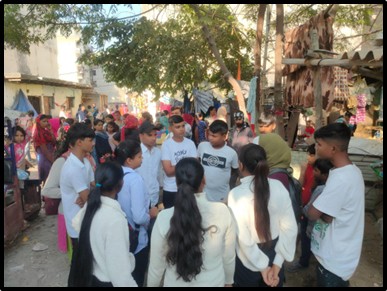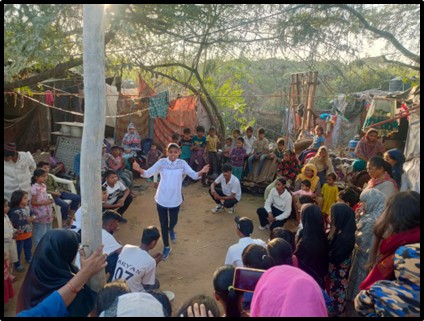The United Nations Declaration on the Elimination of Violence against Women defines gender-based violence as the act of causing physical, sexual, or psychological harm or suffering based on gender. Both offline and online, whether through threats, or usage of force physically, in private or public spaces, gender-based violence impacts women disproportionately.
Even though laws and redressal mechanisms are strengthening, and gender-based violence in spaces like workplaces is being recognised through the implementation of the Sexual Harassment at Workplaces (SHW) Act, it is still a challenge to identify and recognise the different forms of gender-based violence practiced in private spaces, especially homes.
In private spaces, an aggressive display of power by male heads of families in their homes could be considered a way of asserting their authority and dominance over the rest of the family members, especially their wives and daughters. Data from the National Family Health Survey (NFHS)-5 2019-21 shows that one-third of women in India have experienced physical or sexual violence.

KBC leaders planning how to attract the attention of the passers-by through their enactment.
The same survey report by the NHFS reports that 32% of married women (18-49 years) have experienced some form of intimate partner violence - physical, sexual, or emotional. The most common type of spousal violence is physical violence (28%), followed by emotional violence and sexual violence. However, the data only represents findings from cases that are reported. A large share of cases go unreported. A comparative analysis of NFHS’s 2015-16 and NCRB’s 2014-16 by TheMint supports this claim, with them reporting that over 99.1% of the cases go unreported. The average Indian woman is 17 times more likely to face sexual violence from her husband than from others, the analysis shows.
In such cases, it becomes a challenge to identify and recognise the different forms of violence happening in private spaces, especially homes. Another point is that a violent display of aggression derives a sense of pleasure- reasons why we are also drawn to violence displayed through videos, movies and other formats in popular media. Often, these violent displays of aggression are aggravated through mediums like substance.
Based on the findings from the Problem Tree analysis and Participatory Safety Audits conducted by the Kadam Badhate Chalo (KBC) programme leaders of the Martha Farrell Foundation (MFF) in various communities of Delhi, substance abuse emerged as a critical concern. Recognising its impact, particularly the resulting violence within homes, KBC leaders aimed to create a safe space for community reflection and awareness.
To address this issue, in November and December last year, 14 KBC leaders from Tahirpur and Sonia Camp organised a nukkad natak (street play) as an advocacy initiative in partnership with TeamUp for Transformation, a partner organisation of MFF. The KBC leaders came together to create, rehearse, and perform a nukkad natak in five communities of Delhi - Sonia Camp, Tahirpur, Nand Nagri, Noor Nagar, and Jasola Vihar spreading awareness on this issue.
Having seen and faced such experiences of alcohol-related violence in their families, they sought to make their communities aware of and question the violence substance exacerbates in their homes. “Ghar ghar atyaachar bhaiya, kaun zimedaar hai” (Who is responsible, my brother, for the oppression in every house), asked the KBC leaders in their enactment.
The nukkad natak also raised questions about the victim-blaming women and girls go through when they reveal the violence they face. It also highlighted how women and girls go through moral policing by their families and the rest of society. “Cheekh cheekh ke beti puche, kaun zimedaar hai? Maa kehti hai dheere chalo, papa bolein jaldi lauto” [Screaming loudly, the daughter asks, who is responsible (for gender-based violence)? Mother asks to walk slowly (behave ‘lady-like’), and father asks to return home early], the KBC leaders enacted in the play. Taking up the daily forms of violence they face, which is normalised and silenced in patriarchal settings, the KBC leaders mobilised their communities to build a conversation and ponder upon such incidents further.
14-year-old Imran from Tahirpur MCD Colony, Delhi, one of the KBC leaders who participated in the street play, shared, "One of the most powerful tools I discovered was street theatre (nukkad natak). I want to participate in more plays to educate people on different social issues."A great way of utilising theatre as an art form to deliver a message and mobilise their communities, not only did the street play help raise awareness in the communities, but also helped KBC leaders like Imran gain leadership skills.
Another KBC leader from Tahirpur, 18-year-old Jasmin who crafted and performed the play, discovered the power of street theatre as an art form in spreading awareness. She said, “People listen when they see real-life situations being performed. More such plays should be done to start conversations about violence in our society.”
In this regard, the nukkad natak by the KBC leaders was a step forward in changing the mindsets of the communities on various forms of gender-based violence - even the ones that go underreported and are not recognised in the private space - and the significant contributors that lead to gender-based violence in their localities.

Community members watching the play in Noor Nagar.